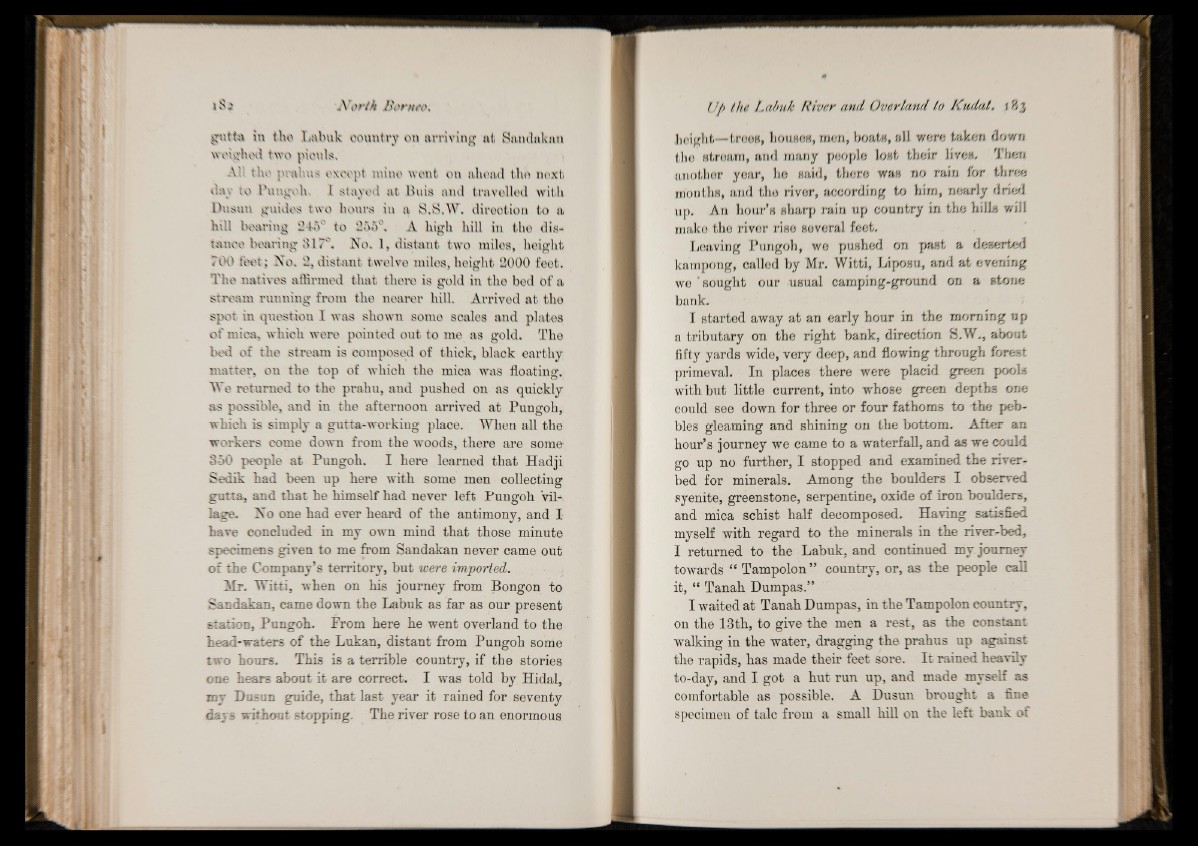
gutta in the Labuk country on arriving all Sandakan
weighed two piculs.
All the pruhns except mine went on ahead the next
day to Pungoh. 1 staved at Buis and travelled with
Dusun guides two hours in a S.S.W. direction to a
hill bearing 2-15° to 255°. A high hill in the distance
bearing 817°. No. 1, distant two miles, height
TOO feet; No. 2, distant twelve miles, height 2000 feet.
The natives affirmed that there is gold in the bed of a
stream running from the nearer hill. Arrived at the
spot in question I was shown some scales and plates
of mica, which were pointed out to me as gold. The
bed of the stream is composed of thick, black earthy
matter, on the top of which the mica was floating.
We returned to the prahu, and pushed on as quickly
as possible, and in the afternoon arrived at Pungoh,
which is simply a gutta-working place. When all the
workers come down from the woods, there are some
350 people at Pungoh. I here learned that Hadji
Sedik had been up here with some men collecting
gutta, and that he himself had never left Pungoh village.
No one had ever heard of the antimony, and I
have concluded in my own mind that those minute
specimens given to me from Sandakan never came out
of the Company’s territory, but were imported.
Mr. Witti, when on his journey from Bongon to
Sandakan, came down the Labuk as far as our present
station, Pungoh. From here he went overland to the
head-waters of the Lukan, distant from Pungoh some
two hours. This is a terrible country, if the stories
one hears about it are correct. I was told by Hidal,
my Dusun guide, that last year it rained for seventy
days without stopping. The river rose to an enormous
height—trees, Louses, men, boats, all were taken down
the stream, and many people lost their lives, 1 hen
another year, he said, there was no rain for three
months, and the river, according to him, nearly dried
up. An hour’s sharp rain up country in the hills will
rriako the river rise several feet.
Loaving Pungoh, wo pushed on past a deserted
kampong, called by Mr. Witti, laposu, and at evening
we sought our usual camping-ground on a stone
bank.
I started away at an early hour in the morning up
a tributary on the right bank, direction S.W., about
fifty yards wide, very deep, and flowing through forest
primeval. In places there were placid green pools
with but little current, into whose green depths one
could see down for three or four fathoms to the pebbles
gleaming and shining on the bottom. After an
hour’s journey we came to a waterfall, and as we could
go up no further, I stopped and examined the riverbed
for minerals. Among the boulders I observed
syenite, greenstone, serpentine, oxide of iron boulders,
and mica schist half decomposed. Having satisfied
myself with regard to the minerals in the river-bed,
I returned to the Labuk, and continued my journey
towards “ Tampolon ” country, or, as the people call
it, ¡¡j Tanah Dumpas.”
I waited at Tanah Dumpas, in the Tampolon country,
on the 13th, to give the men a rest, as the constant
walking in the water, dragging the prahus up against
the rapids, has made their feet sore. I t rained heavily
to-day, and I got a hut run up, and made myself as
comfortable as possible. A Dusun brought a fine
specimen of talc from a small hill 011 the left bank of